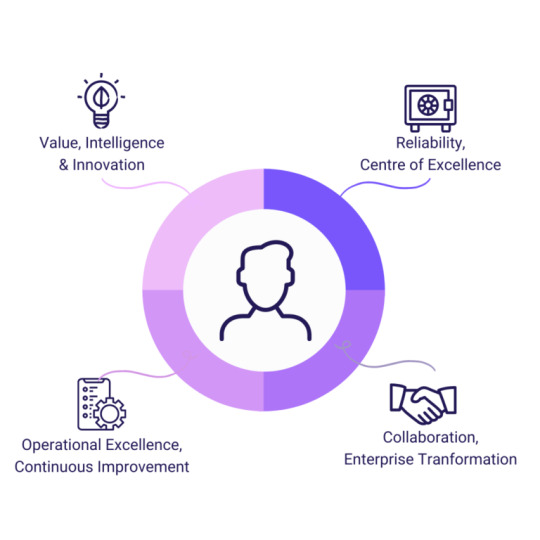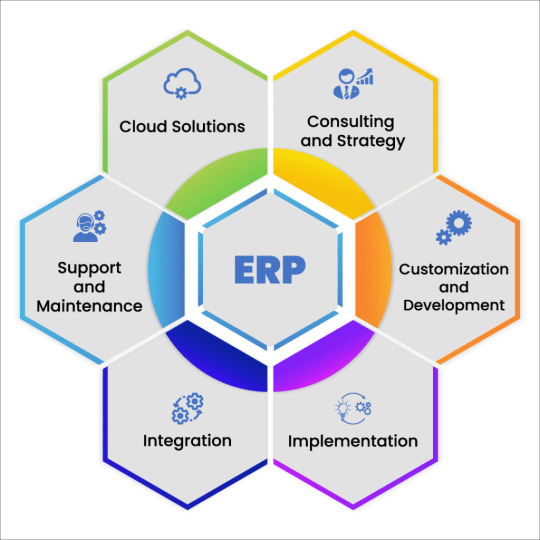#SAP Application Management Service
Explore tagged Tumblr posts
Text

SAP Application Management Services (AMS) involves the processes used to maintain, enhance and manage enterprise SAP environments. It includes the development and customization, implementation, testing, maintenance, and support of SAP enterprise applications. AMS helps keep your business applications bug-free and up-to-date with the latest technological developments.
0 notes
Text
Tired of clunky SAP interfaces?
Is your SAP slowing you down? ⚡️ Mann Lowe's SAP Fiori: Modern UI, mobile access & faster workflows! Ditch the old, embrace efficiency. Learn how! 👇 [https://mannlowe.com/mannlowe-company/]
#SAP#SAPFiori#UXDesign#MobileSAP#BusinessSolutions#MannLowe#sap application services#it services#sap services#sap fiori#sap management services
1 note
·
View note
Text
SAP Application Management Services & AMS Consultant | Apprisia
Get SAP Application Management Services (AMS) & Support Services with 30-minute response time for all your SAP Systems and Modules and a Dedicated Support Team.
https://www.apprisia.com/services/sap-support/sap-application-management-services-ams/
#sap ams support#sap application support services#ams sap#application management services sap#sap application managed services#sap application management services#sap application maintenance and support#sap ams consultant#sap application maintenance
0 notes
Text
SAP S4HANA Public Cloud Uses | SAP Gold Partner 2iSolutions
The versatility of SAP S/4HANA Public Cloud
saps4hana #SAP #sapmm
Within the modern computerized space where things are changing quickly, it has ended up exceptionally basic for businesses to discover imaginative ways of simplifying their forms conjointly remaining competitive. A conceivable arrangement that has gotten to be exceptionally prevalent is SAP S/4HANA Public Cloud. In any case, what is SAP S/4HANA Cloud after all, and what are the purposes for which it is applied? In this total and nitty gritty direct, you’ll pick up an understanding of the numerous capabilities, utilizations, additionally points of interest of SAP S/4HANA Cloud, and how it can be utilized to push business achievements.
Understanding SAP S/4HANA Cloud:
SAP S/4HANA cloud could be a cloud-based intelligent ERP (Undertaking Asset Arranging) arrangement that was created by SAP, a leading computer program firm within the endeavor space. It could be a computerized center for the organizations where they can coordinate additionally oversee all commerce capacities like funds, deals, acquirement, supply chain management, fabricating, etc., through a suite of applications. SAP S/4HANA Cloud, a flight from the on-premise ERP frameworks of the conventional sort, sends the Software-as-a-Service (SaaS) demonstrate, permitting businesses to have the adaptability, versatility, conjointly dexterity vital for them to compete successfully within the show computerized economy.
Applications of SAP S/4HANA Cloud:
Budgetary Administration:
SAP S/4HANA Cloud comes with robust Fund additionally capabilities to empower organizations to handle the bookkeeping forms, budget administration, cost following, and give real-time monetary reports.
With highlights like predictive analytics and conjointly computerized budgetary planning, organizations can pick up complex benefits like investigation of financial performance and can make well-educated choices to attain growth.
Deals and Client Relationship Administration (CRM):
The Client Relationship Administration (CRM) usefulness of SAP S/4HANA Cloud helps companies to efficiently handle client connections, bargain with the deals leads, and enhance the deals forms. Prepared with instruments such as lead scoring, opportunity administration, and too customized showcasing campaigns, companies can raise the level of client engagement and create more income.
Obtainment and Supply Chain Administration:
The SAP S/4HANA Cloud conveys procurement and supply chain administration arrangements from conclusion to end, with the assistance of which the trade can simplify sourcing, obtainment, stock administration, as well as coordination forms. With real-time see into provider execution, stock levels, and arrange status, organizations can improve their supply chain processes, cut down costs, and accomplish higher productivity.
Fabricating and Generation Arranging:
For the industry of fabricating, SAP S/4HANA Cloud gives advanced production arranging and fabricating execution functionalities. Operations include request forecasting, capacity arranging, shop floor planning, and quality administration. Organizations can optimize their manufacturing forms as well as provide the items to showcase speedier, satisfying customer demands precisely.
Rise With SAP S/4HANA Public Cloud includes an assortment of human assets and ability administration highlights that allow organizations to find, keep, and develop the finest individuals. From enlisting, and onboarding, to performance administration and learning and improvement, businesses can use their workforce techniques to move forward in worker engagement and efficiency.
#sap s/4hana#SAP S4HANA#SAP ONE#SAP BUSINESS 1#SAP FOR BUSINESS#SAP CONSULTING#SAP S4 HANA#SAP ANALYTICS CLOUD#SAP INDIA#SAP PRODUCTS#SAP APPLICATION#SAP DEVELOPER#SOLUTION MANAGEMENT SAP#SAP PARTNER#SAP SERVICE#SAP PARTNER COMPANIES#SAP HANA S4#SAP INTEGRATION#SAP BUILDING#SAP BUSINESS PARTNER#SAP IT SUPPORT#SAP Implementation#SAP Implementation Services#SAP Implementation Cost#End to End Implementation in SAP#SAP Implementation Price#SAP Erp Implementation#ERP Deployment
1 note
·
View note
Text
SAP Application Management Services

SAP Application Management Services (AMS) refer to the comprehensive suite of services designed to manage, optimize, and maintain SAP systems within an organization. These services encompass a wide array of tasks, ranging from ongoing support and maintenance to system enhancements and continuous improvement initiatives.
0 notes
Text
Application Management Services for SAP

Explore our top-notch Application Management Services for SAP at Vvolve. We provide expert solutions to optimize, monitor, and enhance your SAP applications, ensuring seamless functionality and performance. Trust us to manage your SAP ecosystem while you focus on strategic growth.
0 notes
Text
Unlock innovation with IngenX's SAP solutions. Elevate HR management, streamline field services, and manage incidents seamlessly. From efficient transport to a resilient supply chain, IngenX optimizes your enterprise. Experience cloud-powered lifecycle management, automated testing, and superior asset management.
#sap human resources management#sap field service management#sap incident management#transport management sap#supply chain management in sap#sap cloud application lifecycle management
1 note
·
View note
Text
Know more about our SAP application management services at:

0 notes
Text
Office Receptionist
Location
Brampton, ON
BenefitsPulled from the full job description
Designated paid holidays
RRSP match
Tuition reimbursement
Full job description
_
Dawn Foods is a global leader in bakery manufacturing and ingredients distribution. As the partner of choice for inspiring bakery success, we help customers grow their business through meaningful partnerships, research-driven insights and innovations, and products and expertise they can depend on. As a family-owned company, our commitments to our people, products, customers, and corporate values, are all part of our recipe for success.
_
Why work for Dawn Foods?
PEOPLE. PRODUCTS. CUSTOMERS.
Why should you apply? We invest in you!
Industry-leading health insurance after 30 days
Competitive Pay
Generous company retirement benefit contributions
10 Paid Company Holidays
3 weeks of vacation each year
Professional training
Family-owned business over 100 years in service
An opportunity for career advancement, working as part of an empowering workforce
What will you do as an Office Receptionistat Dawn Foods?
Answer all incoming telephone calls, direct appropriately and/or take messages
Meet and greet all visitors and provide assistance as required
Oversee and control all office courier services in accordance with standard operating procedures
Manage incoming and outgoing mail and upkeep of postage equipment
Manage invoices in AP system related to Brampton location
Maintain adequate stock of all office and building supplies and control the supply room.
Assist Customer Service team members when needed.
What Does It Take to be an Office Receptionist at Dawn Foods?
Below are the minimum qualifications to be a fit for this job.
Minimum 1 year of experience in an administrative role
Detail oriented and have the ability to work independently and complete objectives.
High School Diploma or GED.
Ability to multi-task
Maintain confidentiality
Proficient in Microsoft Office, including Excel, Word, PowerPoint, Outlook and Teams.
SAP experience preferred but not required.
Physical Demands & Work Environment
The physical demands described here are representative of those that must be met by a Team Member to successfully perform the essential functions of this job. Reasonable accommodations may be made to enable individuals with disabilities to perform the essential functions.
Ability to work in a professional office environment. Will be expected to work onsite.
Specific vision abilities required by this job include close vision, distance vision, color vision, peripheral vision, depth perception, and the ability to focus
Note: The level of physical effort may vary from site to site and in some cases be greater or lesser than documented here.
If this sounds like the opportunity that you have been looking for, please click "Apply.”
About Our Benefits
Dawn is proud to employ the top talent in the baking industry, and we reward our people with competitive compensation packages and award-winning benefit offerings. We also help protect our Team Members’ future financial health with a generous RRSP matching program that provide additional retirement funds and many tools and resources on financial wellness. The contributions start from your first pay. Dawn also encourages professional growth through tuition assistance and educational programs, and we are always searching for ways to improve our industry-leading services and benefits.
Compensation: $41,430 - $62,150 Annual Salary
_
An Equal Opportunity Employer. All qualified applicants will receive consideration for employment without regard to race, color, religion, age, sex, national origin, disability, pregnancy, sexual orientation, gender identity/gender expression, citizenship status, military or veteran status, genetic information or any other status or condition that is protected by applicable law.
2 notes
·
View notes
Text
The Evolution and Impact of ERP Software in the UAE: A Comprehensive Analysis
ERP stands for Enterprise Resource Planning. It is a type of software system that integrates and manages core business processes and functions within an organization. ERP software typically provides a centralized database and a suite of applications that automate and streamline business activities across various departments such as finance, human resources, supply chain management, manufacturing, sales, and customer service.
In the fast-paced landscape of business operations, efficient management of resources and information is critical for success. Enterprises in the United Arab Emirates (UAE) have witnessed a remarkable transformation in their operational efficiency and competitiveness through the adoption of Enterprise Resource Planning (ERP) software. This article delves into the evolution, benefits, challenges, and future trends of ERP software within the UAE context.
In recent decades, Enterprise Resource Planning (ERP) software has played a transformative role in how businesses in the United Arab Emirates (UAE) operate and manage their resources. This article delves into the evolution, adoption, and impact of ERP systems within the UAE's business landscape. By exploring the unique challenges and opportunities presented by the UAE's dynamic economy, we can better understand how ERP software has become an indispensable tool for organizations seeking efficiency, integration, and scalability.
Evolution of ERP Software
The adoption of ERP software in the UAE mirrors global trends but is uniquely shaped by regional business requirements and technological advancements. In the early 2000s, ERP systems gained traction among larger corporations seeking to streamline their complex processes. Major multinational ERP providers like SAP, Oracle, and Microsoft Dynamics established a strong presence in the region, catering to diverse industry needs including finance, manufacturing, retail, and logistics.
A notable development in recent times is the movement towards cloud-centric ERP solutions.This transition offers scalability, flexibility, and cost-effectiveness, allowing businesses in the UAE to manage their operations more efficiently. Local ERP vendors have also emerged, offering tailored solutions that cater specifically to the nuances of the UAE market, such as compliance with local regulations and cultural practices.
Challenges and Obstacles
Despite the numerous benefits, ERP implementation in the UAE is not devoid of challenges. One prominent obstacle is the high initial investment required for ERP deployment, including software licensing, customization, and training costs. For smaller businesses, this financial commitment can be prohibitive, leading to slower adoption rates among SMEs.
Cultural factors and change management also pose challenges. Embracing new technology often requires a shift in organizational culture and employee mindsets. Resistance to change, coupled with the need for extensive training, can hinder the successful implementation of ERP systems in the UAE.
Furthermore, data security and privacy concerns are paramount, especially in light of stringent regulatory frameworks such as the UAE's Data Protection Law. Ensuring compliance with local data protection regulations adds complexity to ERP deployment, necessitating robust cybersecurity measures and data governance protocols.
The Business Landscape of the UAE
The UAE is renowned for its vibrant economy, diversified industries, and strategic geographical location. Over the years, the country has emerged as a global business hub attracting multinational corporations, SMEs, and startups alike. Key sectors such as finance, real estate, construction, logistics, tourism, and manufacturing contribute significantly to the nation's GDP. However, this diversification has also brought complexities in managing business operations efficiently.
The Emergence of ERP Solutions
As businesses in the UAE expanded and diversified, traditional methods of managing operations became inadequate. The need for integrated systems that could streamline processes across departments led to the rise of ERP solutions. Initially developed to manage manufacturing processes, ERP systems evolved to encompass finance, human resources, supply chain, customer relationship management, and more. This evolution mirrored the growth and diversification of UAE businesses.
Factors Driving ERP Adoption
Several factors have fueled the adoption of ERP software among businesses in the UAE:
Global Competition: The UAE's aspiration to compete on a global scale necessitated advanced operational efficiencies that ERP systems could deliver.
Regulatory Compliance: The UAE's regulatory environment, including VAT implementation, required robust financial and reporting capabilities that ERP systems could provide.
Scalability: With rapid economic growth, businesses needed scalable solutions to manage increasing complexities.
Integration Needs: As businesses diversified, the need for seamless integration across functions became crucial.
Challenges in ERP Implementation
While the benefits of ERP systems are substantial, implementing them poses challenges:
Cultural Factors: Embracing technological change and adopting new systems can face resistance due to cultural factors.
Resource Constraints: SMEs may struggle with the limited resources required for ERP implementation and customization.
Data Security and Privacy: The UAE's focus on data security and privacy necessitates robust ERP solutions compliant with local regulations.
Impact of ERP on UAE Businesses
The impact of ERP software on businesses in the UAE has been profound:
Improved Efficiency: Streamlined processes lead to increased productivity and reduced operational costs.
Enhanced Decision Making: Real-time data availability empowers businesses to make informed decisions.
Better Customer Experience: Integrated systems ensure seamless customer interactions and improved service delivery.
Regulatory Compliance: ERP systems aid in meeting regulatory requirements efficiently.
Key ERP Players in the UAE
Several global and regional ERP providers cater to the UAE market, offering tailored solutions to meet local business needs. Major players include SAP, Oracle, Microsoft Dynamics, Sage, and Epicor, among others.
Future Trends and Innovations
Looking ahead, several trends are poised to shape the future of ERP software in the UAE. Artificial Intelligence (AI) and Machine Learning (ML) are increasingly integrated into ERP systems, enabling predictive analytics and automation of routine tasks. This enhances decision-making capabilities and further optimizes business processes.
Mobile ERP applications are also gaining popularity, allowing stakeholders to access critical business data on the go. The rise of Industry 4.0 and the Internet of Things (IoT) is driving demand for ERP solutions that can seamlessly integrate with smart devices and sensors, enabling real-time monitoring and control of operations.
Moreover, the convergence of ERP with other technologies like blockchain promises enhanced transparency and security in supply chain management, crucial for industries like healthcare and finance.
Conclusion
In conclusion, ERP software has become an integral component of the UAE's business ecosystem, driving efficiency, integration, and growth across diverse sectors. While challenges exist, the transformative impact of ERP systems on businesses in the UAE underscores their importance in navigating complex operational landscapes. As technology continues to evolve, so too will the role of ERP in shaping the future of business in the UAE.ERP software has emerged as a transformative tool for businesses in the UAE, driving efficiency, innovation, and competitiveness across industries. Despite challenges such as high costs and cultural adaptation, the benefits of ERP implementation are substantial, ranging from streamlined operations to improved customer satisfaction. Looking ahead, the evolution of ERP software in the UAE is poised to align with global technological advancements, incorporating AI, IoT, and blockchain to unlock new possibilities for business growth and development. As enterprises continue to navigate the digital landscape, ERP remains a cornerstone of strategic management, enabling organizations to thrive in an increasingly complex and dynamic marketplace.
In summary, ERP software has been a game-changer for businesses in the UAE, enabling them to streamline operations, enhance decision-making, and adapt to a rapidly evolving marketplace. As the UAE continues to position itself as a global economic powerhouse, the role of ERP systems will remain pivotal in supporting the growth and sustainability of businesses across various sectors.
2 notes
·
View notes
Text
SAP SF MODULE

Title: SAP SuccessFactors: A Modular Guide to Transforming Your HR
Introduction:
Human Resources (HR) departments are pivotal in driving organizational success in today’s rapidly evolving business landscape. SAP SuccessFactors (SF) is a powerful ally, transforming traditional HR into a strategic force with its cloud-based suite of HR modules. In this blog, we’ll explore these modules and how they can revolutionize your HR processes.
What is SAP SuccessFactors?
SAP SuccessFactors is a cloud-based Human Capital Management (HCM) solution that streamlines and optimizes HR functions. It offers a comprehensive array of modules, each addressing specific HR needs. Whether you want to enhance employee engagement, optimize talent management, or gain actionable HR insights, SuccessFactors delivers the tools for success.
Key SAP SuccessFactors Modules
Let’s break down some of the most potent SAP SF modules:
Employee Central: The core of SuccessFactors. It serves as a centralized HR system of record, housing employee data, payroll, time and attendance, organizational structures, and more.
Recruiting: Streamlines your hiring processes with powerful tools for job postings, applicant tracking, candidate management, and seamless onboarding of new hires.
Onboarding: This provides a welcoming and structured experience for new employees. It automates tasks, provides essential information, and fosters early engagement.
Performance & Goals: Aligns employee goals with organizational objectives, fosters regular feedback, and drives continuous performance improvement.
Compensation: Helps you design and manage competitive compensation plans, ensuring fair and performance-based rewards.
Succession & Development: This department identifies future leaders, develops development plans, and creates a pipeline of talent for critical roles.
Learning: Offers a robust employee training and development platform, supporting diverse learning styles and tracking progress.
Benefits of Using SAP SuccessFactors
Improved Efficiency and Automation: Replaces manual, error-prone processes, saving valuable time and resources for HR teams.
Enhanced Employee Experience: Delivers personalized, self-service HR portals, fostering employee engagement and satisfaction.
Data-Driven Decision Making: Provides powerful analytics and reporting to uncover HR insights, drive informed decisions, and improve strategic workforce planning.
Global Scalability: Supports multinational organizations with a cloud-based system accommodating multi-country regulations and compliance.
Continuous Innovation: Benefits from regular updates and new feature releases, ensuring your HR technology stays at the cutting edge.
Getting Started with SAP SuccessFactors
Implementing SAP SuccessFactors takes careful planning. Here’s how to begin:
Assess Your Needs: Identify your HR pain points and areas for improvement.
Choose the Right Modules: Map those needs to specific SuccessFactors modules.
Partner with an Expert: Consider a certified SAP SuccessFactors consultant to ensure a smooth implementation.
Conclusion
SAP SuccessFactors is a game-changer, empowering HR to catalyze business growth. Its modular approach lets you tailor a solution to your organization’s unique needs. If you’re ready to modernize your HR, exploring SAP SuccessFactors is an investment you won’t regret.
youtube
You can find more information about SAP HR in this SAP HR Link
Conclusion:
Unogeeks is the No.1 IT Training Institute for SAP HR Training. Anyone Disagree? Please drop in a comment
You can check out our other latest blogs on SAP HR here – SAP HR Blogs
You can check out our Best In Class SAP HR Details here – SAP HR Training
———————————-
For Training inquiries:
Call/Whatsapp: +91 73960 33555
Mail us at: [email protected]
Our Website ➜ https://unogeeks.com
Follow us:
Instagram: https://www.instagram.com/unogeeks
Facebook: https://www.facebook.com/UnogeeksSoftwareTrainingInstitute
Twitter: https://twitter.com/unogeeks
2 notes
·
View notes
Text
ABOUT US
We offer unique software solutions to grow your business. We are group of experienced software architect, engineers, testers and project managers. We have built many applications and products using several technologies..
AmpleServ products and solutions are used worldwide. With vertical focus toward best industry solutions Enterprise Resource Planning (ERP), Hotel Management, Social Media Apps, HCM Payroll Solution, e-Commerce, Integration Systems, Project Management and several products to extend core functionality of SAP Business One. Apart from the streamlined services, we offer a bunch of products..
2 notes
·
View notes
Text
Charting the Course to SAP HANA Cloud
The push towards SAP HANA cloud shift stems from the need for agility and responsiveness in a dynamic business climate. The cloud promises reduced infrastructure expenses, robust data analytics, and the nimbleness to address changing needs quickly. However, for many companies, transitioning from on-premise SAP HANA to the cloud involves navigating concerns around data security, performance, and potentially relinquishing control of business-critical ERP systems.
SAP HANA Enterprise Cloud: A Tailored Offering
In light of these challenges, SAP presented the SAP HANA Enterprise Cloud (HEC), a private cloud service designed expressly for mission-critical workloads. HEC advertises no compromise on performance, integration, security, failover, or disaster recovery. It spotlights versatility, strong customer support, and end-to-end coverage - from strategic planning to application management. This offering intends to provide the cloud’s agility and innovation under SAP’s direct guidance and expertise.
Actual Delivery of HANA Enterprise Cloud
Despite SAP’s messaging, the HEC’s delivery involves a consortium of third-party providers, including HPE, IBM, CenturyLink, Dimension Data, and Virtustream. SAP collaborates with these partners, who bid on projects often awarded to the lowest bidder, to leverage specialized capabilities while upholding SAP’s standards.
Weighing the Pros and Cons
Partnering with competent vendors ensures clients receive secure, best-practice SAP hosting and support. HEC’s comprehensive solution integrates licensing, infrastructure, and support with touted scalability and integration.
However, several customer challenges emerge. Firstly, leveraging SAP’s brand for cloud hosting and SAP managed services risks diminishing anticipated cost savings. Secondly, the lack of direct engagement with third-party providers raises concerns about entrusting critical ERP operations to unseen partners. This dynamic obscures visibility and control over SAP HANA migration and management.
Furthermore, the absence of a direct relationship between SAP HANA users and cloud suppliers may complicate support, especially for urgent issues warranting rapid response. While SAP’s ecosystem aims to guarantee quality and security, intermediation can hinder the timely resolution of critical situations, affecting system uptime and operations.
SAP HANA Cloud: A Strategic Decision
As SAP systems become increasingly vital, migrating SAP HANA is not simply a technical or operational choice but a strategic one. SAP HANA transcends a database or software suite – it constitutes a competitive advantage that, when optimized, can spur tremendous innovation and success. This migration necessitates meticulous planning, execution, and governance to ensure the transition empowers rather than compromises SAP HANA’s strategic value.
In this context, selecting the ideal cloud model and service providers represents critical decisions. Companies must scrutinize partners beyond cost, evaluating track records, SAP skills, security protocols, and the aptitude to deliver personalized, responsive service.
The Future SAP HANA Cloud Trajectory
As we advance into 2024, the SAP DATA Cloud Analytics landscape continues evolving. Innovations in cloud technology, security, and service creation provide new prospects for migration planning. Firms must stay updated on cloud service advancements, SAP’s strategic direction, and cloud shift best practices to navigate this transition successfully.
To accomplish this, companies should:
Collaborate cross-functionally to align SAP HANA cloud plans with broader business goals and technology roadmaps.
Ensure chosen cloud environments and suppliers meet rigorous data security, privacy, and regulatory standards.
Assess infrastructure ability to support SAP HANA performance requirements and scale amid fluctuating demands.
Institute clear governance and support structures for effective issue resolution throughout and post-migration.
Transitioning SAP HANA to the cloud is complex but ultimately rewarding, unlocking efficiency, agility, and innovation when executed deliberately. By weighing the strategic, operational, and technical dynamics, businesses can drive this migration smoothly, fully capturing SAP HANA’s power to fuel future prosperity.
2 notes
·
View notes
Text
Exploring the Significance of ERP Software: How It Works, Why It's Vital for Companies, and the Benefits for Your Business
Enterprise Resource Planning (ERP) software stands as the backbone of modern businesses, planning a masterpiece of operations seamlessly. This comprehensive suite of integrated applications manages core business processes, including finance, HR, inventory, supply chain, and more. Its significance lies in its ability to streamline operations, enhance efficiency, and foster data-driven decision-making.
Cloud-based ERP solutions offer a versatile edge over traditional on-premises systems. They facilitate real-time data accessibility, scalability, and cost-effectiveness. Conversely, on-premises ERP software provides robust security and customization options, ideal for businesses with specific compliance needs or intricate operational structures.
Adopting the best ERP Software Consulting Solutions is a strategic move for companies, as it centralizes disparate processes into a unified platform, eradicates data silos, and enhances collaboration, thereby boosting productivity and offering a comprehensive view of the business for smarter, data-backed decisions."

The benefits of ERP software for your business are multifaceted. It optimizes resource utilization, streamlines workflows, minimizes errors, and accelerates reporting cycles. This ultimately results in improved customer satisfaction, reduced operational costs, and better agility in responding to market changes.
When seeking the best ERP software development services, solutions, implementation, or consulting, businesses must prioritize expertise, reliability, and compatibility. The best ERP software development services and solutions cater to unique business needs, offering tailor-made solutions for seamless integration and functionality.
Choosing the best ERP software implementation services or solutions involves a thorough evaluation of the provider's track record, customer reviews, and adaptability to your company's requirements. Expert ERP software consulting services navigate businesses through the maze of choices, ensuring optimal software selection, implementation, and long-term success.
In conclusion, the strategic implementation of ERP software can revolutionize business operations, driving efficiency, innovation, and competitiveness. Selecting the best ERP software development, implementation, and consulting services is pivotal for maximizing the benefits and leveraging the full potential of this transformative technology.
ERP Offerings & Practice's
SAP/S4 HANA ERP Software Solutions
Ellucian Banner ERP Software Solutions
Peoplesoft ERP Software services
Oracle Cloud ERP Software services
UKG ERP Software services
Salesforce ERP Software services
3 notes
·
View notes
Text
What is the best IFRS software
Best International Financial Reporting Standards (IFRS) software because the choice of software depends on the specific needs and requirements of the organization. Different companies may have distinct preferences based on factors such as size, industry, complexity of financial reporting, and integration capabilities with existing systems.
However, there are several reputable software solutions that are commonly used for IFRS reporting and compliance. Keep in mind that the landscape might have changed, and new solutions may have emerged since my last update.
Workiva:
Workiva offers cloud-based solutions for finance, compliance, and data management. It is known for its collaborative and workflow management features.
Tagetik (owned by Wolters Kluwer):
Tagetik provides a unified platform for financial performance management, including IFRS reporting. It is designed to streamline funds processes and improve compliance.
Oracle Financial Services Analytical Applications (OFSAA):
Oracle's OFSAA suite includes modules for various budgetary functions, including regulatory info. It is designed to help wealthy institutions comply with IFRS and other reporting standards.
SAP S/4HANA:
SAP's ERP solution, S/4HANA, includes financial modules that can support IFRS. SAP is widely used in large enterprises across various industries.
Datar ails:
Data Rails offers a platform that automates funds reporting, budgeting, and forecasting. It is designed to improve the accuracy and efficiency of income processes.
Hubble (by insight software):
Hubble is an integrated suite of performance management apps. It provides solutions for financial reporting, analytics, and planning.
OneStream Software:
OneStream offers a unified CPM (Corporate Performance Management) platform that includes solutions for financial consolidation and planning, supporting IFRS compliance.
When choosing an IFRS software solution, it's essential to consider factors such as the organization's specific information needs, budget, scalability, ease of use, and integration capabilities with existing systems. Additionally, staying informed about updates and reviews in the financial software market is crucial to ensuring that the chosen solution meets the latest standards and regulations.
2 notes
·
View notes